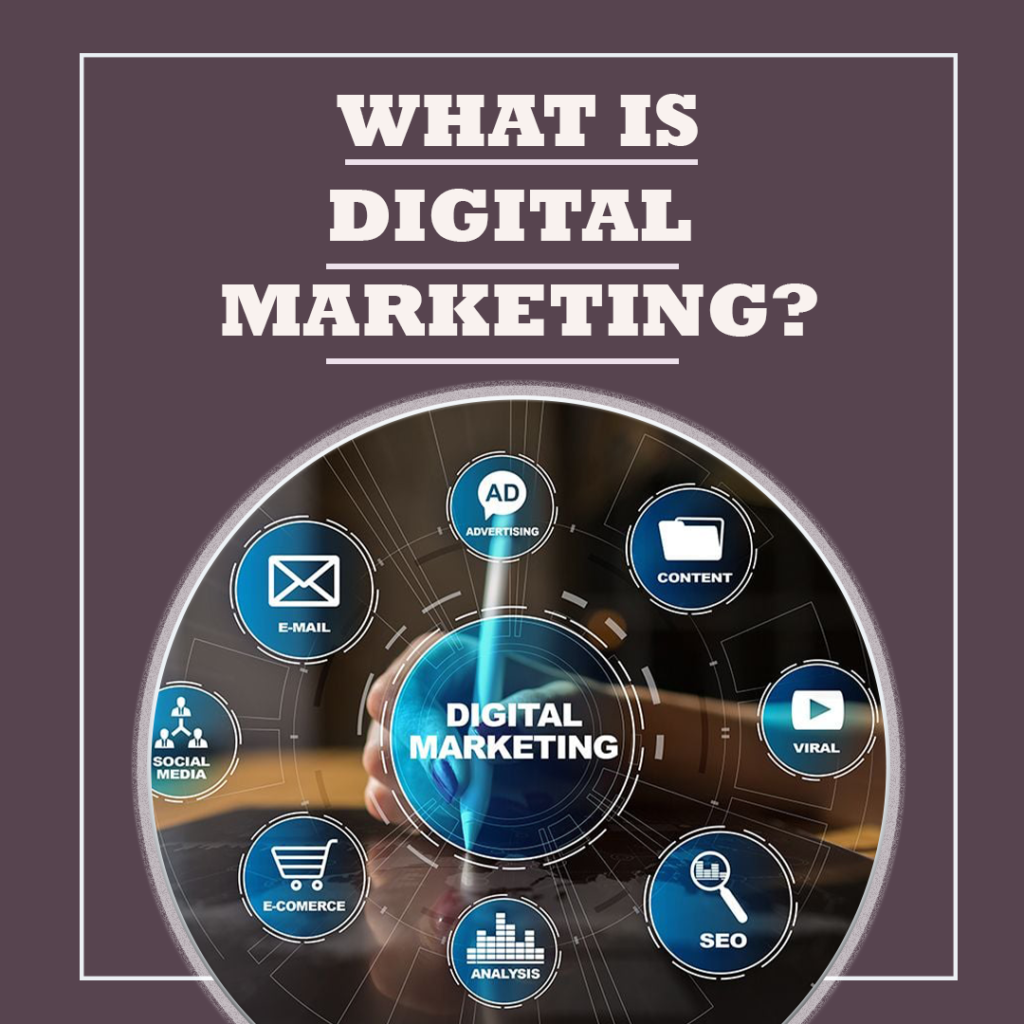Digital Marketing?
Digital marketing is the practice of promoting goods, services, and brands via the use of digital platforms, channels, and technology. It covers an extensive array of methods and techniques intended to interact with clients and potential clients via online channels. Among the essential elements of digital marketing are:

- Search Engine Optimization: By improving a website’s content and structure, search engine optimization (SEO) raises its organic traffic ranking and helps it appear higher in search engine results pages (SERPs).
- Content Marketing: The process of creating and distributing worthwhile, timely, and coherent material in order to draw in and keep a target audience is known as content marketing. Blogging, films, infographics, ebooks, and more can all fall under this category.
- Social Media Marketing: Social media marketing is promoting goods and services, interacting with consumers, and increasing brand awareness through the use of social media platforms (such as Facebook, Instagram, Twitter, LinkedIn, etc.).
- Pay Per Click: Advertising on websites like Google Ads and social media that requires users to pay a fee each time their ad is clicked is known as pay-Per-Click (PPC) advertising. This covers social media, display, and search advertising.
- Email Marketing: Email marketing is the practice for advertising items, providing news, and cultivating client connections by sending customized emails to a list of subscribers.
- Affiliate Marketing: As an affiliate, you collaborate with other companies or people to market your items in return for a portion of the revenue that they generate in. This is known as affiliate marketing.
- Influencer Marketing: Working together with influencers that have a sizable fan base to market goods and services to their audience is known as influencer marketing.
Strategies of Digital Marketing
Utilizing a variety of online platforms and techniques to accomplish particular corporate objectives is a key component of a well-thought-out digital marketing strategy. This is a detailed how-to for creating a strong digital marketing plan:
- Determine Your Objectives : Set quantifiable, explicit targets that correspond with your overarching business objectives. These could include enhancing sales, creating leads, generating website traffic, and raising brand awareness.
- Identify Your Target : To find and comprehend the characteristics, preferences, habits, and problems of your target market, conduct market research. To direct your marketing efforts, create buyer personas.
- Study of Rivalries : Examine the digital marketing tactics used by your rivals. To find chances for improvement and differentiation, analyze their advantages and disadvantages.
- Make a financial plan : Every digital marketing campaign should have a budget. Think about the expenses associated with creating content, paid advertising, software tools, and other resources.
- Put marketing tools to use and integrate them :
- Automate and simplify procedures with the use of digital marketing technologies. Possible tools are:
- SEO Tools (SEMrush, Ahrefs, etc.)
- Email marketing platforms, such as HubSpot and Mailchimp
- Tools for managing social media (such as Hootsuite and Buffer)
- Analytics Tools (such as Hotjar and Google Analytics)
- Put Your Plan Into Practice : Start running your ads on the digital platforms of your choice. Make sure your messaging and branding are consistent.
- Keep an eye on and evaluate performance : Key performance indicators (KPIs) include website traffic, conversion rates, email open rates, and return on investment can be monitored with the use of analytics software. To determine what is and is not working, analyze data.
- Enhance and Refine :
- Refine your techniques and strategies using performance data. To test out various strategies and enhance outcomes, run A/B testing.
- Crucial Strategies for Digital Marketing
- Search Engine Optimization, or SEO
To rank better in search results and draw in organic traffic, optimize the content and structure of your website.
Marketing of Content
Table Of Contents
